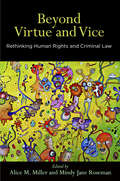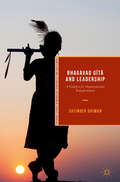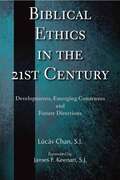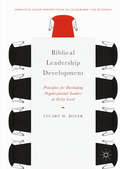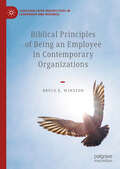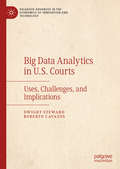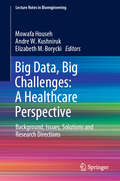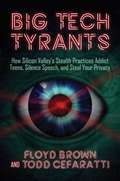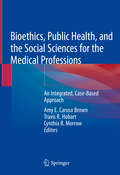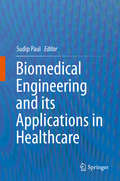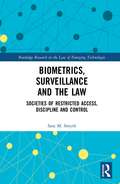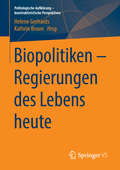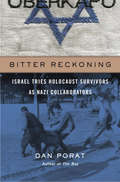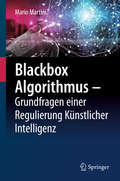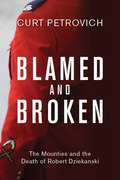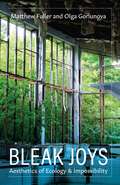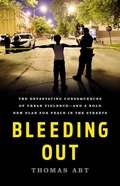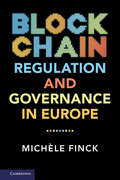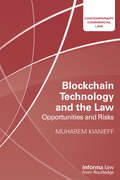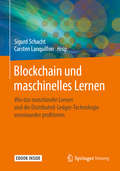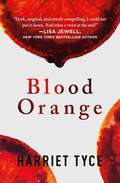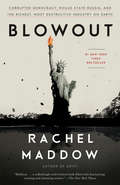- Table View
- List View
Beyond Virtue and Vice: Rethinking Human Rights and Criminal Law (Pennsylvania Studies in Human Rights)
by Alice Miller Mindy RosemanOver the past two decades, human rights as legal doctrine and practice has shifted its engagement with criminal law from a near exclusive condemnation of it as a source of harm toward increasingly invoking it as a necessary remedy for abuses. These shifts are most visible in the context of sexuality, reproduction, and gender. <P><P>Criminal law appears in modern states as a tool for societies to define forbidden acts (crimes) and prescribe punishments. It authorizes the state to use force as an aspect of expressing and establishing norms—societal expectations for acceptable behavior which when breached permit individuals to be excluded and stigmatized as unfit for inclusion. <P><P> But the core principles of human rights oppose exclusion and stigma and embrace the equality and dignity of all. Therefore there is an insuperable tension when human rights actors invoke criminal law to protect and vindicate human rights violations.Beyond Virtue and Vice examines the ways in which recourse to the criminal law features in work by human rights advocates regarding sexuality, gender, and reproduction and presents a framework for considering if, when, and under what conditions, recourse to criminal law is compatible with human rights. <P><P>Contributors from a wide range of disciplinary fields and geographic locations offer historical and contemporary perspectives, doctrinal cautionary tales, and close readings of advocacy campaigns on the use of criminal law in cases involving abortion and reproductive rights, HIV/AIDS, sex work and prostitution law, human trafficking, sexual violence across genders, child rights and adolescent sexuality, and LGBT issues. <P><P>The volume offers specific values and approaches of possible use to advocates, activists, policy makers, legislators, scholars, and students in their efforts to craft dialogue and engagement to move beyond state practices that compromise human rights in the name of restraining vice and extolling virtue. <P><P>Contributors: Aziza Ahmed, Widney Brown, Sealing Cheng, Sonia Corrêa, Joanna N. Erdman, Janet Halley, Alli Jernow, Maria Lucia Karam, Ae-Ryung Kim, Scott Long, Vrinda Marwah, Alice M. Miller, Geetanijali Misra, Rasha Moumneh, Wanja Muguongo, Oliver Phillips, Zain Rizvi, Mindy Jane Roseman, Esteban Restrepo Saldarriaga, Tara Zivkovic.
Bhagavad Gītā and Leadership: A Catalyst for Organizational Transformation (Palgrave Studies in Workplace Spirituality and Fulfillment)
by Satinder DhimanThis book shows how the Bhagavad Gītā (part of the great Indian epic — the Mahābhārata) can be approached as a powerful tool for change management and as a catalyst for organizational transformation. It presents time-tested leadership strategies drawn from the Bhagavad Gītā that are relevant for today’s leaders. This book focuses on how to harmonize the needs of the individual with the needs of society, and by extension, how to harmonize the needs of employees and the organization. It employs an inside-out leadership development approach based on Self-knowledge and Self-mastery, the two highly important areas for practicing effective Self-leadership. The Gītā is a non-sectarian spiritual text with a universal message for living a life of meaning, purpose, and contribution and for leading from our authentic self. It shows how to manage oneself, as a necessary prelude to leading others. Students and organizational leaders will learn to integrate leadership function more effectively into all aspects at the individual, team, and institutional level.
Bharatiya Nagarik Suraksha Sanhita 2023: Criminal Law-2
by P. Jaganathan Usha JaganathanThe book provides a comprehensive analysis of India's newly introduced Bharatiya Nagarik Suraksha Sanhita, 2023, which replaces the Code of Criminal Procedure, 1973. It covers critical aspects of criminal procedure, investigation, trials, and sentencing, integrating technological advancements and time-bound remedies for a more efficient justice system. Additionally, the book explores the Juvenile Justice (Care and Protection of Children) Act, 2015, amended in 2021, focusing on rehabilitation and child protection. The Probation of Offenders Act, 1958 is also examined, highlighting reformative justice for first-time offenders. Designed for law students, educators, and legal practitioners, this updated edition provides case laws, exam-oriented notes, and simplified explanations to enhance legal understanding.
Biblical Ethics In The 21st Century: Developments, Emerging Consensus, And Future Directions
by Lúcás ChanReviews and critiques the major attempts at biblical ethics over the past twenty years by both biblical theologians and theological ethicists, focusing on New Testament ethics as an illustration.
Biblical Leadership Development: Principles for Developing Organizational Leaders at Every Level (Christian Faith Perspectives in Leadership and Business)
by Stuart W. BoyerThis book examines the principles and procedures implemented by Moses for developing leaders. Using Exodus 18 as the basis, the author explores how leadership skills are best developed in small group settings. The author then delves into contemporary leadership principles, such as authentic leadership, and how organizations can develop leaders at every level of the organization. Issues such as accountability, ethics, and trust will be discussed at length, with an examination of the expected outcomes of training leaders at all levels. This book will be a valuable addition to the leadership literature in showing how biblical leadership principles can be used in contemporary organizations.
Biblical Principles of Being an Employee in Contemporary Organizations (Christian Faith Perspectives in Leadership and Business)
by Bruce E. WinstonThis book focuses on how employees should work and follow in contemporary organizations. It begins with the call from Col 3:22-24 for employees to treat work as worship to God and to conduct their work to the best of their ability (Prov 22:29). It then explains how employees should help each other but not to the point of self-defeat (Galatians 6). Employees are then cautioned for the need to be true followers but to know the extent to which being a follower might call them to be committed to both the organization and the leader/manager. This is the concept of Akoloutheo. The rewards of being diligent and faithful employees are conveyed through an examination of the Parable of the Talents. The book concludes with an admonishment to everyone to prepare versus plan for one’s personal life. Managers plan for projects but should prepare for what God asks each of us to do and then to accept the opportunities that God presents to us.
Big Data Analytics in U.S. Courts: Uses, Challenges, and Implications (Palgrave Advances in the Economics of Innovation and Technology)
by Dwight Steward Roberto CavazosThis Palgrave Pivot identifies the key legal, economic, and policy issues surrounding the allowance to use and interpret electronic data consistently and in a scientifically valid manner in U.S. courts. Evidence based on the analysis of large amounts of electronic data ("Big Data") plays an increasing role in civil court disputes, providing information that could not have been obtained from a witness stand. While Big Data evidence presents opportunities, it also presents legal and public policy challenges and concerns. How can one be sure that deviations found in Big Data fall outside the norm? If statistical analyses can be conducted and presented different ways, how can judges and juries make sense of conflicting interpretations? When does Big Data extraction stop being investigative and instead become an invasion of privacy? This book traces the history of Big Data use in U.S. courts, couples current case studies with legal challenges to explore key controversies, and suggests how courts can change the way they handle Big Data to ensure that findings are statistically significant and scientifically sound.
Big Data, Big Challenges: Background, Issues, Solutions and Research Directions (Lecture Notes in Bioengineering)
by Mowafa Househ Andre W. Kushniruk Elizabeth M. BoryckiThis is the first book to offer a comprehensive yet concise overview of the challenges and opportunities presented by the use of big data in healthcare. The respective chapters address a range of aspects: from health management to patient safety; from the human factor perspective to ethical and economic considerations, and many more. By providing a historical background on the use of big data, and critically analyzing current approaches together with issues and challenges related to their applications, the book not only sheds light on the problems entailed by big data, but also paves the way for possible solutions and future research directions. Accordingly, it offers an insightful reference guide for health information technology professionals, healthcare managers, healthcare practitioners, and patients alike, aiding them in their decision-making processes; and for students and researchers whose work involves data science-related research issues in healthcare.
Big Tech Tyrants: How Silicon Valley's Stealth Practices Addict Teens, Silence Speech, and Steal Your Privacy
by Floyd Brown Todd CefarattiThey are driven without respect for the lives they are changing…“Boy Kings,” or Big Tech Tyrants, are considered the most powerful individuals in the world. They’re the autocratic aristocrats who run the tech giants in Silicon Valley, and if the labels are accurate, they suggest these social platform operators have gained a non-elected (or, should we say, a self-elected) authoritarian power. They wield it with more effectiveness and precision than any sitting government or military strategist. Big Tech Tyrants boast riches beyond emperors of old but act like juveniles who don’t want to grow up. They are modern-day robber barons. Big Tech Tyrants don’t know the meaning of privacy, when it comes to you. They try to make you believe they will give their products away for free as a service to society, when really, they are vacuuming your personal data. They use this data to discover your deepest secrets. Are you or your partner trying to get pregnant? Are you underwater financially? Are you having an extramarital affair? Do you have a tidy nest egg? Are you a Trump supporter? Are you a Bernie Sanders follower? Are you a Scientologist, Mormon, Christian, or Buddhist? Your personal data is extremely valuable to them—and they use it—and abuse. These tyrants knowingly addict users to make more money. Not only that, they also consider themselves the most enlightened the world has ever seen—so they know what’s best for you to see—from the news and information you read to the political candidates they think you should vote for. They censor news and only let you see what they want you to see. This is an eye-opening must read for anyone living in the twenty-first century!
Bioethics, Public Health, and the Social Sciences for the Medical Professions: An Integrated, Case-Based Approach
by Amy E. Caruso Brown Travis R. Hobart Cynthia B. MorrowThis unique textbook utilizes an integrated, case-based approach to explore how the domains of bioethics, public health and the social sciences impact individual patients and populations. It provides a structured framework suitable for both educators (including course directors and others engaged in curricular design) and for medical and health professions students to use in classroom settings across a range of clinical areas and allied health professions and for independent study.The textbook opens with an introduction, describing the intersection of ethics and public health in clinical practice and the six key themes that inform the book's core learning objectives, followed by a guide to using the book. It then presents 22 case studies that address a broad spectrum of patient populations, clinical settings, and disease pathologies. Each pair of cases shares a core concept in bioethics or public health, from community perspectives and end-of-life care to medical mistakes and stigma and marginalization. They engage learners in rigorous clinical and ethical reasoning by prompting readers to make choices based on available information and then providing additional information to challenge assumptions, simulating clinical decision-making. In addition to providing a unique, detailed clinical scenario, each case is presented in a consistent format, which includes learning objectives, questions and responses for self-directed learning, questions and responses for group discussion, references, and suggested further reading. All cases integrate the six themes of patient- and family-centered care; evidence-based practice; structural competency; biases in decision-making; cultural humility and awareness of the culture of medicine; and justice, social responsibility and advocacy. The final section discusses some challenges to evaluating courses and learning encounters that adopt the cases and includes a model framework for learner assessment.
Biomedical Engineering and its Applications in Healthcare
by Sudip PaulThis book illustrates the significance of biomedical engineering in modern healthcare systems. Biomedical engineering plays an important role in a range of areas, from diagnosis and analysis to treatment and recovery and has entered the public consciousness through the proliferation of implantable medical devices, such as pacemakers and artificial hips, as well as the more futuristic technologies such as stem cell engineering and 3-D printing of biological organs. Starting with an introduction to biomedical engineering, the book then discusses various tools and techniques for medical diagnostics and treatment and recent advances. It also provides comprehensive and integrated information on rehabilitation engineering, including the design of artificial body parts, and the underlying principles, and standards. It also presents a conceptual framework to clarify the relationship between ethical policies in medical practice and philosophical moral reasoning. Lastly, the book highlights a number of challenges associated with modern healthcare technologies.
Biometrics, Surveillance and the Law: Societies of Restricted Access, Discipline and Control (Routledge Research in the Law of Emerging Technologies)
by Sara M. SmythThe use of biometric identification systems is rapidly increasing across the world, owing to their potential to combat terrorism, fraud, corruption and other illegal activities. However, critics of the technology complain that the creation of an extensive central register of personal information controlled by the government will increase opportunities for the state to abuse citizens. There is also concern about the extent to which data about an individual is recorded and kept. This book reviews some of the most current and complex legal and ethical issues relating to the use of biometrics. Beginning with an overview of biometric systems, the book goes on to examine some of the theoretical underpinnings of the surveillance state, questioning whether these conceptual approaches are still relevant, particularly the integration of ubiquitous surveillance systems and devices. The book also analyses the implementation of the world’s largest biometric database, Aadhaar, in detail. Additionally, the identification of individuals at border checkpoints in the United States, Australia and the EU is explored, as well as the legal and ethical debates surrounding the use of biometrics regarding: the war on terror and the current refugee crisis; violations of international human rights law principles; and mobility and privacy rights. The book concludes by addressing the collection, use and disclosure of personal information by private-sector entities such as Axciom and Facebook, and government use of these tools to profile individuals. By examining the major legal and ethical issues surrounding the debate on this rapidly emerging technology, this book will appeal to students and scholars of law, criminology and surveillance studies, as well as law enforcement and criminal law practitioners.
Biopolitiken – Regierungen des Lebens heute: Regierungen Des Lebens Heute (Politologische Aufklärung – konstruktivistische Perspektiven)
by Helene Gerhards Kathrin BraunDas Buch versammelt konstruktivistische Perspektiven auf das Konzept „Biopolitik“. Dadurch werden die Analysepotentiale für aktuelle Phänomene, die den Zusammenhang zwischen dem Leben und dem Lebendigen und der Regierbarmachung betreffen, ausgelotet. Im Fokus stehen die Strategien und die Objekte der Regierungs- und Regulierungsbemühungen: In welcher Weise werden gesellschaftliche Probleme konstruiert und bestimmten „Zielscheiben“ zugeschrieben? Welche Subjektivierungsformen lassen sich im Rahmen biopolitischer Zugriffe ausmachen? Inwiefern spielen spezifische sozialtheoretische Überlegungen und Konzeptionen von Zeit für biopolitische Strategien und Konflikte eine Rolle? An welchen Gegenständen sind die fortdauernden Konflikte, die sich im Spannungsfeld zwischen Medizin, Ethik und Politik ergeben, zu explizieren?
Bitter Reckoning: Israel Tries Holocaust Survivors as Nazi Collaborators
by Dan PoratDigging into newly declassified archives, Dan Porat unearths the story of Jews prosecuted by the State of Israel for Nazi collaboration. Over time courts and the public came to see Jewish ghetto administrators or kapos as tragic figures. Rigorous yet humane, Porat invites us to rethink ideas about victimhood, justice, and collective memory.
Blackbox Algorithmus – Grundfragen einer Regulierung Künstlicher Intelligenz
by Mario MartiniDieses Buch liefert eine rechtswissenschaftliche Analyse der Chancen und Gefahren algorithmenbasierter Verfahren. Algorithmen, die im Maschinenraum moderner Softwareanwendungen werkeln, sind zu zentralen Steuerungsinstanzen der digitalen Gesellschaft avanciert. Immer nachhaltiger beeinflussen sie unser Leben. Ihre Funktionsweise gleicht aber teilweise einer Blackbox. Die in ihr schlummernden Risiken zu bändigen, fordert die Rechtsordnung heraus. Das Buch beleuchtet die gesellschaftlichen Gefahren einer zunehmenden gesellschaftlichen Steuerung durch Algorithmen und entwickelt erste Regulierungsideen, mit deren Hilfe sich die Wertschöpfungspotenziale automatisierter digitaler Prozesse mit den Grundwerten der Rechtsordnung versöhnen lassen.
Blamed and Broken: The Mounties and the Death of Robert Dziekanski
by Curt PetrovichA few fleeting seconds, captured on video, led to a frustrating search for justice tainted by ego, bias, and a desire for vengeance. Images of Robert Dziekanski convulsing after being shocked by a Mountie’s Taser went viral in 2007. International outrage and domestic shame followed the release of that painful video. It had taken just twenty-six seconds for four Mounties to surround and stun the Polish would-be immigrant at Vancouver International Airport. A decade later, after millions of dollars spent on an inquiry, and bungled prosecutions laden with bias and interference, the tragic impact of those fleeting seconds on the people involved — Dziekanski's mother and the four Mounties — is at last revealed.
Bleak Joys: Aesthetics of Ecology and Impossibility (Posthumanities #53)
by Matthew Fuller Olga GoriunovaA philosophical and cultural distillation of the bleak joys in today&’s ambivalent ecologies and patterns of lifeBleak Joys develops an understanding of complex entities and processes—from plant roots to forests to ecological damage and its calculation—as aesthetic. It is also a book about &“bad&” things, such as anguish and devastation, which relate to the ecological and technical but are also constitutive of politics, the ethical, and the formation of subjects.Avidly interdisciplinary, Bleak Joys draws on scientific work in plant sciences, computing, and cybernetics, as well as mathematics, literature, and art in ways that are not merely illustrative of but foundational to our understanding of ecological aesthetics and the condition in which the posthumanities are being forged. It places the sensory world of plants next to the generalized and nonlinear infrastructure of irresolvability—the economics of indifference up against the question of how to make a home on Planet Earth in a condition of damaged ecologies. Crosscutting chapters on devastation, anguish, irresolvability, luck, plant, and home create a vivid and multifaceted approach that is as remarkable for its humor as for its scholarly complexity.Engaging with Deleuze, Guattari, and Bakhtin, among others, Bleak Joys captures the modes of crises that constitute our present ecological and political condition, and reckons with the means by which they are not simply aesthetically known but aesthetically manifest.
Bleeding Out: The Devastating Consequences of Urban Violence--and a Bold New Plan for Peace in the Streets
by Thomas AbtFrom a Harvard scholar and former Obama official, a powerful proposal for curtailing violent crime in America Urban violence is one of the most divisive and allegedly intractable issues of our time. But as Harvard scholar Thomas Abt shows in Bleeding Out, we actually possess all the tools necessary to stem violence in our cities.Coupling the latest social science with firsthand experience as a crime-fighter, Abt proposes a relentless focus on violence itself -- not drugs, gangs, or guns. Because violence is "sticky," clustering among small groups of people and places, it can be predicted and prevented using a series of smart-on-crime strategies that do not require new laws or big budgets. Bringing these strategies together, Abt offers a concrete, cost-effective plan to reduce homicides by over 50 percent in eight years, saving more than 12,000 lives nationally. Violence acts as a linchpin for urban poverty, so curbing such crime can unlock the untapped potential of our cities' most disadvantaged communities and help us to bridge the nation's larger economic and social divides.Urgent yet hopeful, Bleeding Out offers practical solutions to the national emergency of urban violence -- and challenges readers to demand action.
Blockchain Regulation and Governance in Europe
by Michèle FinckIn Blockchain Regulation and Governance in Europe, Michèle Finck examines the relationship between blockchain technology and EU law and introduces the theme of blockchain governance. The book provides a general introduction to blockchains as both a regulatable and a regulatory technology and outlines the interaction between distributed ledger technology and specific areas of EU law, such as the General Data Protection Regulation. It should be read by anyone interested in EU law, the relationship between law, innovation and technology, and technology governance.
Blockchain Technology and the Law: Opportunities and Risks (Contemporary Commercial Law)
by Muharem KianieffBlockchain Technology and the Law: Opportunities and Risks is one of the first texts to offer a critical analysis of Blockchain and the legal and economic challenges faced by this new technology. This book will offer those who are unfamiliar with Blockchain an introduction as to how the technology works and will demonstrate how a legal framework that governs it can be used to ensure that it can be successfully deployed. Discussions included in this book: - an introduction to smart contracts, and their potential, from a commercial and consumer law perspective, to change the nature of transactions between parties; - the impact that Blockchain has already had on financial services, and the possible consumer risks and macro-economic issues that may arise in the future; - the challenges that are facing global securities regulators with the development of Initial Coin Offerings and the ongoing risks that they pose to the investing public; - the risk of significant privacy breaches due to the online public nature of Blockchain; and - the future of Blockchain technology. Of interest to academics, policy-makers, technology developers and legal practitioners, this book will provide a thorough examination of Blockchain technology in relation to the law from a comparative perspective with a focus on the United Kingdom, Canada and the United States.
Blockchain und maschinelles Lernen: Wie das maschinelle Lernen und die Distributed-Ledger-Technologie voneinander profitieren
by Sigurd Schacht Carsten LanquillonDurch Bitcoin wurde die Blockchain als zugrundeliegende Technologie bekannt. Sie zählt zu den Distributed-Ledger-Technologien, die zukünftig viele Bereiche des wirtschaftlichen Handels beeinflussen werden. So bergen dezentrale autonome Anwendungen enormes Potenzial, nicht nur Prozesse, sondern auch Vertragsabstimmungen zu automatisieren. Beispielsweise kann ein automatisiertes wirtschaftliches Handeln zwischen Maschinen ermöglicht werden. Um einen derart hohen Automatisierungsgrad zu erreichen, müssen datenbasierte Entscheidungen autonom – ohne menschliches Zutun – getroffen werden. Maschinelle Lernverfahren können dabei eine zentrale Komponente bei der Entscheidungsfindung einnehmen. Das Buch stellt erstmalig die komplementären Themengebiete Distributed-Ledger-Technologie und maschinelles Lernen gegenüber und zeigt auf, welches Potenzial freigesetzt werden kann, wenn beide Technologien zielführend miteinander verbunden werden. Das Buch ist eine unverzichtbare Lektüre für diejenigen, die sich tiefgreifendes Wissen in der Kombination beider Themengebiete aufbauen wollen, indem einerseits die theoretischen Grundlagen und andererseits auch mögliche Anwendungsszenarien dargestellt werden.
Blood Orange
by Harriet TyceA young lawyer's outwardly perfect life spirals out of control as she takes on her first murder case in this dark and twisty debut thriller for readers of Paula Hawkins, A.J. Finn, or Shari Lapena.Alison has it all. A doting husband, adorable daughter, and a career on the rise--she's just been given her first murder case to defend. But all is never as it seems... Just one more night. Then I'll end it. Alison drinks too much. She's neglecting her family. And she's having an affair with a colleague whose taste for pushing boundaries may be more than she can handle.I did it. I killed him. I should be locked up. Alison's client doesn't deny that she stabbed her husband - she wants to plead guilty. And yet something about her story is deeply amiss. Saving this woman may be the first step to Alison saving herself.I'm watching you. I know what you're doing.But someone knows Alison's secrets. Someone who wants to make her pay for what she's done, and who won't stop until she's lost everything....
Blowout: Corrupted Democracy, Rogue State Russia, and the Richest, Most Destructive Industry on Earth
by Rachel MaddowBig Oil and Gas Versus Democracy—Winner Take All <P><P>In 2010, the words “earthquake swarm” entered the lexicon in Oklahoma. That same year, a trove of Michael Jackson memorabilia—including his iconic crystal-encrusted white glove—was sold at auction for over $1 million to a guy who was, officially, just the lowly forestry minister of the tiny nation of Equatorial Guinea. And in 2014, Ukrainian revolutionaries raided the palace of their ousted president and found a zoo of peacocks, gilded toilets, and a floating restaurant modeled after a Spanish galleon. <P><P>Unlikely as it might seem, there is a thread connecting these events, and Rachel Maddow follows it to its crooked source: the unimaginably lucrative and equally corrupting oil and gas industry. With her trademark black humor, Maddow takes us on a switchback journey around the globe, revealing the greed and incompetence of Big Oil and Gas along the way, and drawing a surprising conclusion about why the Russian government hacked the 2016 U.S. election. She deftly shows how Russia’s rich reserves of crude have, paradoxically, stunted its growth, forcing Putin to maintain his power by spreading Russia’s rot into its rivals, its neighbors, the West’s most important alliances, and the United States. <P><P>Chevron, BP, and a host of other industry players get their star turn, most notably ExxonMobil and the deceptively well-behaved Rex Tillerson. The oil and gas industry has weakened democracies in developed and developing countries, fouled oceans and rivers, and propped up authoritarian thieves and killers. But being outraged at it is, according to Maddow, “like being indignant when a lion takes down and eats a gazelle. You can’t really blame the lion. It’s in her nature.” <P><P>Blowout is a call to contain the lion: to stop subsidizing the wealthiest businesses on earth, to fight for transparency, and to check the influence of the world’s most destructive industry and its enablers. The stakes have never been higher. As Maddow writes, “Democracy either wins this one or disappears.” <P><P><b>A New York Times Bestseller</b>
Blue Legalities: The Life and Laws of the Sea
by Irus Braverman Elizabeth R. Johnson Eds.The ocean and its inhabitants sketch and stretch our understandings of law in unexpected ways. Inspired by the blue turn in the social sciences and humanities, Blue Legalities explores how regulatory frameworks and governmental infrastructures are made, reworked, and contested in the oceans. Its interdisciplinary contributors analyze topics that range from militarization and Maori cosmologies to island building in the South China Sea and underwater robotics. Throughout, Blue Legalities illuminates the vast and unusual challenges associated with regulating the turbulent materialities and lives of the sea. Offering much more than an analysis of legal frameworks, the chapters in this volume show how the more-than-human ocean is central to the construction of terrestrial institutions and modes of governance. By thinking with the more-than-human ocean, Blue Legalities questions what we think we know—and what we don&’t know—about oceans, our earthly planet, and ourselves. Contributors. Stacy Alaimo, Amy Braun, Irus Braverman, Holly Jean Buck, Jennifer L. Gaynor, Stefan Helmreich, Elizabeth R. Johnson, Stephanie Jones, Zsofia Korosy, Berit Kristoffersen, Jessica Lehman, Astrida Neimanis, Susan Reid, Alison Rieser, Katherine G. Sammler, Astrid Schrader, Kristen L. Shake, Phil Steinberg
Bonds of Secrecy: Law, Spirituality, and the Literature of Concealment in Early Medieval England (The Middle Ages Series)
by Benjamin A. SaltzmanWhat did it mean to keep a secret in early medieval England? It was a period during which the experience of secrecy was intensely bound to the belief that God knew all human secrets, yet the secrets of God remained unknowable to human beings. In Bonds of Secrecy, Benjamin A. Saltzman argues that this double-edged conception of secrecy and divinity profoundly affected the way believers acted and thought as subjects under the law, as the devout within monasteries, and as readers before books. One crucial way it did so was by forming an ethical relationship between the self and the world that was fundamentally different from its modern reflex. Whereas today the bearers of secrets might be judged for the consequences of their reticence or disclosure, Saltzman observes, in the early Middle Ages a person attempting to conceal a secret was judged for believing he or she could conceal it from God. In other words, to attempt to hide from God was to become ensnared in a serious sin, but to hide from the world while deliberately and humbly submitting to God's constant observation was often a hallmark of spiritual virtue.Looking to law codes and religious architecture, hagiographies and riddles, Bonds of Secrecy shows how legal and monastic institutions harnessed the pervasive and complex belief in God's omniscience to produce an intense culture of scrutiny and a radical ethics of secrecy founded on the individual's belief that nothing could be hidden from God. According to Saltzman, this ethics of secrecy not only informed early medieval notions of mental activity and ideas about the mind but also profoundly shaped the practices of literary interpretation in ways that can inform our own contemporary approaches to reading texts from the past.
